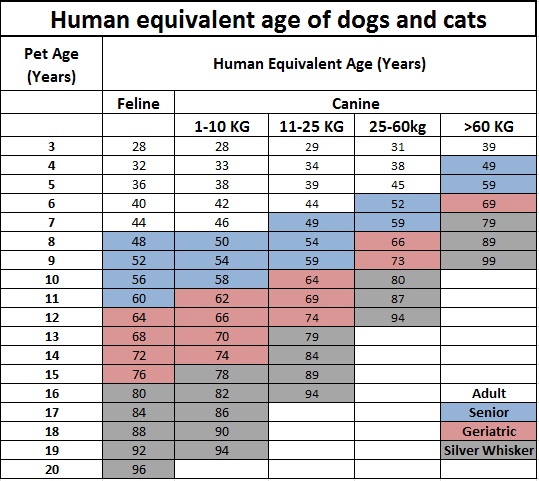Seniors
Senior Health Checks
Significant advances in veterinary medicine mean that we are able to extended the life expectancy of dogs and cats and keep them healthy and happy to very advanced ages. Although old age is not a disease, and senior dogs and cats may not outwardly appear old, it is a time when many diseases are more likely to occur. Early detection allows prompt intervention and more successful outcomes with treatment. Routine monitoring of the senior patient is essential to identify any new condition and monitor response to therapy. Generally dogs and cats over 8 years of age are considered senior. Check out the human age equivalent chart at the bottom of the page…
During the senior health check we will:
- Perform a comprehensive nose to tail examination
- Perform early diagnostic tests if required
- Assess the nutritional needs of your pet
- Discuss any changes you have seen in your pet since your last visit
- kidney disease
- dental disease
- liver disease
- heart disease
- gastrointestinal conditions
- arthritis
- obesity
- diabetes
- hyperthyroidism (cats)
- hypothyroidism (dogs)
- other endocrine diseases
- cancer
- deterioration of brain function
- vision problems
The earlier these diseases are detected the better the chance of managing them successfully.
Goals of senior health care is to have them living:-
- Happier – making the most out of every day
- Healthier – improving quality of life
- Longer – maximising length of life
Book in now for a senior pet health check and wellness testing
Senior dogs and cats need to be seen at least twice a year. This is equivalent to your aging grandmother or grandfather going to their doctor every 3 years! Alot can change in that time frame and the earlier a problem is detected, the more likely we will be able to help. Most times the pet will benefit from wellness blood testing. This achieves good baseline data and allows us to monitor trends. We are well supported by local pathology laboratories that give us really well priced senior wellness testing packages. Pets on long-term medications need to have wellness blood tests twice a year to ensure ongoing safety of the medications. The key to living happier, healthier and longer is regular examination and assessment!

Human equivalent age chart
- Most dogs and cats over 8 years of age are considered senior. However breed, genetics, nutrition and environment make a considerable difference. There is a large disparity between the average life expectancy of a small breed dog and that of a large breed dog.
- The old adage of dogs and cats aging seven years to one human year is not entirely accurate. See the above chart to calculate your dog or cats equivalent age.
